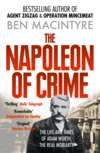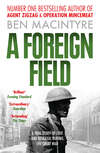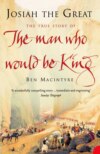Читать книгу: «The Napoleon of Crime: The Life and Times of Adam Worth, the Real Moriarty», страница 2
TWO
A Fine War

FOURTEEN YEARS EARLIER, at the end of August 1862, the armies of the Union and the Confederacy had come to grips in a muddy Virginia field and blasted away at each other for two days in an encounter known to history as the Second Battle of Bull Run, one of the very bloodiest engagements of the American Civil War.
According to official war records, more than three thousand soldiers died in that carnage including one Adam Worth, who was just eighteen at the time.
Bull Run was the scene of Worth’s first death and first reincarnation. Reports of his death were, of course, greatly exaggerated and so far from perishing on the Virginia battlefields, the young Worth had survived the war in excellent health with a changed name, a deep aversion to bloodshed and a wholly new career as an impostor stretching out before him. The Civil War almost destroyed America, but after the bloodletting the country fashioned itself anew, and so did Worth. Over the next forty years he would vanish and then reappear under a new name with a regularity and ease that baffled the police of three continents.
Worth was notoriously reticent when it came to discussing the years before his strange renaissance at Bull Run – the better, perhaps, to preserve the myriad myths that clustered around them. Some later accounts insisted that he was the product of a wealthy Yankee family and an expensive education, a gentleman criminal in the Raffles tradition. Another stated, categorically and without corroboration, that ‘his father was a Russian Pole and his mother a German’. The great detective William Pinkerton, a man who came to know Worth better than any other, insisted that he was the child of a rich Massachusetts burgher who had sent his son to a private academy to learn an honest business, only to see him seduced into crime by bad company in the stews of New York. ‘Had he continued an upright life, he undoubtedly would have become famous as a businessman,’ the worthy Pinkerton lamented. Another important figure in Worth’s life, a notorious thief and gangster’s moll named Sophie Lyons, concurred in the belief that Worth had come from good stock, reporting that he was ‘born of an excellent family and well educated, [but] formed bad habits and developed a passion for gambling’.
Worth himself was the last person to deny such glamorous beginnings which were, like so many aspects of his existence, a very considerable distance from the truth. Adam Worth (or Wirth, or even, occasionally, Werth) was born in 1844 somewhere in eastern Germany. His father and mother were German Jews who emigrated to the United States when Worth was just five years old. Speaking no English and almost destitute, Worth père set up shop as a tailor in the town of Cambridge, Massachusetts. No other details about Worth’s mother and father have survived, but one may surmise that their parenting skills, particularly in the area of ethical guidance, were distinctly lacking: not only did Adam Worth take to crime at an early age, but his younger brother John quickly followed suit and his sister, Harriet, continued the family tradition by marrying a crooked lawyer.
Worth’s first lesson in swindling was apparently learned in a Cambridge school playground. Pinkerton liked to tell the story of how Worth ‘entered school when six years of age, and was very soon after, as he himself stated, drawn into a trade with a boy larger than himself, who offered to give him a brand new penny for two old ones’. The child Worth, finding the newly minted coin a more attractive object than his two old ones, agreed to the swap and returned home to show his father, who ‘gave him a most unmerciful whipping’, thus ‘impressing on him the value of the new penny as against his two old ones’.
‘From that day until his death, no one, be he friend or foe, honest or dishonest, Negro or Indian, relative or stranger, ever got the better of Adam Worth in any business transactions, regular or irregular,’ Pinkerton concluded.
The young Worth grew up, or rather did not grow up, to be small in stature, measuring between five feet four and five feet five, according to police records. Contemporaries made much of his lack of height, and his criminal colleagues, who were nothing if not literal when it came to the allocation of sobriquets, called him ‘Little Adam’. In reality, for an age when human beings were appreciably smaller than they are now, he was not much below average height, but it suited the purposes of those who could not help admiring him to make our man out to be a midget, for thus his evil-doing was magnified and his ability to thwart authority appeared the more remarkable. When the Scotland Yard detective Robert Anderson called him ‘the Napoleon of the criminal world’, he was referring not only to the man’s nefarious accomplishments and criminal stature, but also to his contrasting lack of inches. The undersized Worth quickly developed an outsized Napoleonic complex.
Worth’s height was always the first physical feature noted by the various detectives, policemen, crooks and lovers who came into contact with him. The second was his eyes, which were dark, almost black, penetrating voids beneath shaggy eyebrows, suggestive of intelligence and determination. When he became enraged, which was seldom, they bulged unpleasantly. He had thick hair, which he wore short and combed to one side, a prominent curved nose and, in later life, a long moustache which curled across his cheeks to meet a pair of mighty side whiskers.
If Worth’s tough childhood left him with a cynical determination to outdo his peers by guile, it also seems to have imbued him with an intense romanticism. As his father scraped together a living to keep his brood alive in the malodorous hovel that was the Worth family home, his eldest son’s imagination released him to a world of grand dinners, fine apparel and civilized conversation.
In the Harvard students who paraded through Cambridge, the immigrant Jewish urchin had ample opportunity to observe the outward show of wealth and privilege. The brighter the penny, he saw, the easier the counterfeit. Ashamed of his lowly origins, frustrated by impecunity, the young Worth clearly felt himself to be the equal of the finest of the young gentlemen strutting Boston Common. Their wealth and sophistication provoked ambivalent feelings, of envy, resentment and anger, but also of admiration and desire. Worth resolved to ‘better’ himself.
America, then as now, promised all things to all men, even if it did not always deliver. It was a time when ‘ambition’, as Cardinal Newman wrote, ‘sets everyone on the lookout to succeed and to rise in life, to amass money, to gain power, to depress his rivals, to triumph over his hitherto superiors, to affect a consequence and a gentility which he had not before’. Worth shared those aspirations, and would eventually realize them. His methods alone would set him apart from other ‘self-made men’, for what others had earned, inherited or bought, he would simply steal, winning respectability by robbery, effrontery and fraud. Where his father had toiled to make clothes for the vanity of rich men, Worth would spin himself the dazzling outfit of a pretender, from pilfered cloth.
But it would be wrong to see the young Worth as merely a creature of immorality, a natural-born wrecker of the social fabric. From an early age he espoused many of the worthiest principles: loyalty to family and friends, the virtues of hard work, perseverance, generosity, charity and courage. As he entered his teens Little Adam was already evolving into a character of many and conflicting parts: selfish, greedy and generous to a fault, at once ruthless and romantic. He regarded his fellow men, and particularly his social superiors, with undiluted cynicism, yet he would never swindle a friend, rob a poor man or harm the harmless. He was acutely aware of the difference between right and wrong and evolved a code of behaviour that he held with the same resolute conviction as would any pillar of society, while he turned society’s codes upside down. Adam Worth had plenty of time for morals; it was laws he disdained. The hard, uncertain circumstances of Worth’s early life left him with the deeply held conviction that it was possible to be a ‘good’ man, at least in his own estimation, while pursuing a life of calculated deceit.
As he emerged from a deprived childhood into an adolescence that offered little better, Worth took the fateful decision to rid himself of his first, unglamorous life. At the age of fourteen, Worth ran away from home, leaving behind his humble parents and their status as social outcasts. The idea of a career in crime and imposture may not yet have formed in his young mind, but Worth already knew what he did not want. He never again set foot inside his childhood home, but a need for family love, and perhaps also for the strong father-figure that his own father never was, marked the rest of his restless existence.
After some months of leading ‘a vagabond life in the city of Boston’, he drifted to New York where he took, for the first and only time, an honest job as a clerk ‘in one of the leading stores in New York City’. Worth never offered any details of this brief flirtation with paid work, master criminals being notoriously touchy about that sort of thing, and the experiment was, anyway, cut short by the start of the American Civil War. At the age of seventeen, the store clerk from Massachusetts promptly abandoned the tedious job of filling in ledgers, and joined a New York regiment in the Union Army preparing to march south for battle.
Worth’s name first appears in the register of the 34th New York Light Artillery, better known as the Flushing or ‘L’ Battery, which assembled in Long Island. He was officially mustered into the regiment in New York City on 28 November 1861, and received a ‘bounty of $1,000’, according to Pinkerton. Many young recruits inflated their ages upon joining up, to appear more mature than they were and thus hasten possible promotion. The seventeen-year-old Worth gave his age as twenty, his first recorded lie.
The commander of the Flushing Battery was a German-born shoemaker named Jacob Roemer, who had emigrated to New York in 1839. Captain Roemer was a fussy, irascible man with a thrusting beard, crossed eyes and the bristling face of a natural martinet. Vain, blustering and courageous to the point of insanity, many years later Roemer wrote a massively self-inflating memoir, apparently designed to prove that the author himself was primarily responsible for winning the war. Young Worth, Roemer’s fellow countryman by birth, seems to have caught the eye of his commander, for he was soon promoted to corporal and then, on 30 June 1862, to the rank of sergeant in command of his own cannon and five men. Worth was well on his way to becoming a successful soldier, but he had by now fallen into bad, and thoroughly congenial, company. ‘He became associated with some wild companions, whom he had met at dances and frolics’ while in New York, Pinkerton later recorded.
The life of the Flushing Battery was anything but frolicsome. For several months, the soldiers drilled on Long Island, learning to wheel the field guns under the obsessively critical inspection of Captain Roemer. Then, in early summer, Captain Jacob Roemer, five commissioned officers, Sergeant Adam Worth, 150 men, no horses, 12 baggage mules and a laundry woman packed up and headed south to join the rest of the Union Army under the command of that dithering incompetent, General Pope, deservedly one of the least remembered generals of the entire Civil War. In Washington they drilled some more, around the unfinished Capitol building. Worth clearly hated every moment, and even Roemer admitted that Camp Barry was a ‘mud hole’.
‘All we wanted was a chance to prove our devotion and our loyalty to our country,’ the prickly and patriotic Roemer wrote. Worth already had other ideas. Indeed, his first taste of army life compounded a blossoming disrespect for authority.
During the early part of August the Union Army and the Confederates, under the command of Thomas ‘Stonewall’ Jackson, warily circled each other in the fields and hills of Virginia. The Flushing Battery took part in several violent skirmishes, but it was not until late August that Roemer’s men tasted the full horror of battle when the two sides met head on, for the second time in the war, near the stream known as Bull Run.
On the evening of 28 August, thanks largely to Captain Roemer’s absurd determination to cover himself and his men in glory and blood, the Flushing Battery found itself engaged at close quarters with the enemy in the middle of Manassas valley. Roemer enjoyed every moment. ‘Shot and shell flew thick and fast,’ he recalled, as the gunners fired off 207 rounds and somehow beat the enemy back. ‘I was triumphant,’ wrote Roemer. One of his terrified lieutenants, however, was found hiding under a bush and had to be removed, gibbering, from the field. The battery commander was in his element, belting around the battlefield expecting, perhaps even hoping, to be shot by the enemy and leaving a trail of appropriately heroic last words as he went. On the 30th he gave a pep-talk to his troops. ‘Boys, it is no longer of any use to keep from you what may be in store for us,’ he announced gleefully. ‘Before the sun sets to-night, many of you may have given up your lives; perhaps I myself will have to, but all I have to say is – Die like men; do not run like cowards. Stick to your guns, and, with the help of God and our own exertions, we may get through. Forward march.’ What Worth made of Roemer’s epic oratory may be deduced from his subsequent actions.
A few hours later L Battery was caught up in the fiercest engagement so far. ‘Bullets, shot and shell fell like hail in a heavy storm … bullets were dropping all around and shells were ploughing up the ground. Men were tumbling, horses were falling and it certainly looked as though “de kingdom was a-comin”,’ recalled Roemer, who had his horse shot from under him and received, to his transparent delight, a flesh wound in the right thigh. Finally the enemy retreated. The Union Army was soundly defeated at Bull Run, but the unstable Captain Roemer regarded the battle as an immense personal victory.
From Adam Worth’s point of view, however, the most intriguing fact about the engagement at Bull Run is that he did not, officially speaking, survive it.
Roemer was unemotional in recording the passing of young Worth: ‘During this battle, generally known as the Second Battle of Bull Run or Manassas, 29-30 August 1862, the casualties in Battery L were fourteen enlisted men wounded (including Sergeant Adam Wirth [sic], mortally wounded) besides myself, three horses killed and 21 wounded.’ According to his army records, Adam Worth died at the Seminary Hospital, Georgetown, on 25 September from wounds received at the battle three weeks earlier.
What really happened to Adam Worth at Bull Run must be a matter of speculation for, unlike Roemer and for obvious reasons, he did not write his war memoirs. Certainly he was wounded during the engagement. He later boasted of the fact, yet the injury does not appear to have been serious. At some point between 30 August, when he was carried from the battlefield, and 25 September, when he was officially listed as dead, Worth successfully made his escape. Perhaps he swapped his identification with another, mortally wounded soldier, or perhaps in the confused aftermath of battle when so many injured and dying were crammed into the nation’s capital, he merely ended up as a fortuitous clerical error, marked down on the wrong list. Either way, Worth emerged from the battlefields of Virginia with only a superficial wound and an entirely new identity. Adam Worth was now officially no more, and thus could move on without fear of pursuit. For the first time, but not the last, he reinvented himself and became a professional ‘bounty jumper’.
Over the coming months Worth established a system: he would enlist in one regiment under an assumed name, collect whatever bounty was being offered, and then promptly desert. Thus he drifted from one part of the sprawling army to another, changing his alias at every stop and developing a talent for masquerade that would later become a full-time profession. William Pinkerton, who was himself a young soldier in the Union Army at the time, reported that Worth, after his first desertion and re-enlistment, was ‘stationed for a time on Riker’s island, N.Y. [and] from there he was conveyed by steamship to the James River in Virginia, where he was assigned to one of the New York regiments in the Army of the Potomac.’ Although the war convinced Worth of the futility of violence, his desertions were prompted by avarice rather than cowardice, and he repeatedly found himself in the thick of battle including, according to Pinkerton, the famous Battle of the Wilderness in May 1864, an engagement scarcely less ferocious than the Battle of Bull Run.
Desertion was a lucrative but highly risky business. ‘On his third enlistment,’ according to one of his criminal associates, ‘he was recognised as a bounty jumper, and was in consequence sent, in company with others of his class, chained together, to the front of the Army of the Potomac.’ Once more, Worth somehow emerged unscathed; he promptly deserted and re-enlisted again. There was clearly a limit to how long Worth could get away with changing regiments so, in a remarkable act of brass cheek, he now decided to change sides. As a contemporary wrote: ‘About this time General Lee of the Southern Army issued a proclamation to the effect that all Federal soldiers who would desert from the Federal armies to the Confederate lines, bringing their arms with them, would receive thirty dollars from the Confederate Government, and also receive a free pass to cross the frontier back into the United States by way of the adjoining States of West Virginia and Kentucky.’
The aspiring crook, untroubled by niceties such as loyalty to the Union cause, immediately ‘took advantage of these exceptionally liberal terms, and deserted one night in company with some others, while doing picket duty’. He did not linger in the South, and having collected his thirty dollars travelled back ‘through the Confederate States on foot, in order to gain the frontier of the Northern States’. He would doubtless have repeated the process several more times, but before he could do so the war came to an end, and so did the first phase of Worth’s criminal career.
Worth was just one of thousands of young soldiers to find themselves at loose ends with the declaration of peace. William Pinkerton, a man who came to play a defining role in Worth’s life and was to become his most reliable chronicler, was another. Before long the two men would become adversaries on either side of the law, then grudging mutual admirers, then co-conspirators and finally, most bizarrely, friends. Their paths did not cross until the war’s end, but already they were dark and light reflections of one another. Like the bright and tarnished pennies of Worth’s childhood, they were similar in value but utterly different in lustre.
The elder son of Allan Pinkerton, a Scotsman who had founded the great detective agency in Chicago in 1850, William Pinkerton was Worth’s exact contemporary and had enrolled in the Union Army at much the same time. Where Worth’s early life had been marked by material want and a complete absence of moral guidance, Pinkerton was brought up in well-to-do Chicago under a regime of the strictest ethical rules. Allan Pinkerton was a superb detective but a brutal father and a fantastic prig who hammered the virtues of honesty, integrity and raw courage into his children and employees with something close to fanaticism. William did his best to live up to these exacting standards, but could never be quite good enough. Working with his father, Abraham Lincoln’s official spymaster, William Pinkerton not only ran agents across the border into Confederate territory but was also present on the first flight of an observation hot-air balloon during the Civil War. Brave, bluff and energetic, Pinkerton was wounded in the knee by an exploding shell at the Battle of Antietam, having already ‘gained experience that was invaluable to him in the vocation which he was to follow’. He attended Notre Dame College in Indiana for a year and then joined his father’s fast-growing detective agency where he soon established a reputation as a tireless lawman, one of the first and perhaps the greatest of the American detective breed. The Pinkertons chose as their symbol an unblinking human eye and the motto ‘The Eye that Never Sleeps’, from which the modern term ‘private eye’ has evolved.
The lives and subsequent careers of Worth and Pinkerton starkly demonstrate the moral duality that so obsessed Victorians. They shadowed and echoed one another, the detective playing Holmes to Worth’s Moriarty, yet they were birds of a feather in their tastes, attitudes and opinions. Both, to a remarkable degree, represented typical American stories of self-created men from immigrant stock, rugged in their opportunism, sturdy in their beliefs, but at opposite poles of conventional morality. Worth would have made an outstanding detective; Pinkerton, a talented criminal. The American Civil War was a grimly levelling experience, but its end allowed the country to begin to rebuild and reinvent itself once more. The two men emerged from the battlefields determined, like thousands of others, to make their mark. They took diametrically opposed routes to that goal, but a lifetime later the bounty jumper and the war hero would end up, in a way neither could have predicted, on the same side.
Pinkerton’s had been a remarkable war, but then the official military record of Sergeant Adam Worth was also one of unblemished bravery and tragic heroism: a young and promising soldier mortally wounded while defending the Union on the battlefield at Bull Run. In truth, of course, he had spent the war dodging the authorities, swapping sides, abandoning the flags of two rival armies and collecting a tidy profit along the way.
Бесплатный фрагмент закончился.













